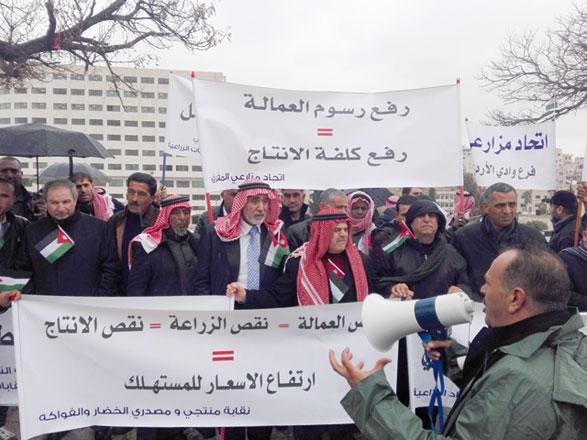You are here
‘Agricultural sector ailed by more than financial troubles’
By Sawsan Tabazah - Apr 07,2018 - Last updated at Apr 07,2018
AMMAN — Panelists on Friday said that the government’s policies towards the “financially ailed” agricultural sector are contributing to labour exploitations.
During a debate titled “Are government policies supportive of workers in the agriculture sector”, which was organised by Tamkeen for Legal Aid and Human Rights, participants discussed issues facing Jordanian and Egyptian agricultural workers and the sector as a whole.
Yousef Masoud, a land owner, said that the sector has been suffering losses since the multiple border closures including the Jordanian-Syrian border, the trade route to Qatar through Saudi Arabia as well as the Iraqi border, which reopened six months ago after two years of closure.
The government’s decision to impose a 10 per cent tax on agricultural inputs was faced with rejection and anger by farmers who protested the decision for almost two months in front of Parliament.
Meanwhile, the expense of the agricultural sector workforce is another burden, as salaries of labourers reach 40 per cent of the production costs, Masoud noted.
The president of the Specific Union for farmer Women in Jordan, Zeinab Momani, said that while the sector suffers, workers also do, especially women.
“Labour rights of women farmers are unprotected by a contract like guest workers. They work per diem with an average daily allowance of JD5, and the minimum safety procedures are not provided in the workplace nor in transportation. Most farmers suffer from asthma due to unsafe usage of pesticides and many suffer injuries from falling from pickups that transfer them to and from the farms,” Momani said.
Financial challenges are secondary to issues such as the poor working conditions and labour exploitations that farmers face, Momani stressed.
Mohammad Mitwali, an Egyptian farmer, said that long working hours, unpaid annual and sick leaves and the lack of health insurance are some of the labour exploitations pushing Egyptian workers — estimated at 100,000 in the Kingdom — to leave farms and enter other sectors.
Director of Guest Workers Department at the Ministry of Labour Bilal Salhab said that labour exploitations in the agriculture sector are "rarely" reported therefore usually considered as individual cases.
“The minimum rights of workers are protected by law,” Salhab stated.
However, Mitwali and Momani argued that labour exploitations are "widespread and severe", but workers are deterred from filing complaints due to fear of losing a source of income and ignorance of the law.
Mitwali maintained that land owners exploit guest workers in many ways. “The worker pays JD400 before arrival to his Kafeel [individual sponsor], JD350 to obtain a work permit, JD50 for a medical report, and JD50 to get a leave,” he said.
The farmer also noted that land owners "sell" Egyptian workers willing to work in Jordan by selling their agricultural contracts through brokers, adding that once they arrive in the Kingdom, they are leaked to other sectors. “An agriculture contract is valued at JD1,500 in the [black] market today,” he claimed.
Hebatul Hayat Obeidat, a journalist leading the debate, questioned the delay in issuing a by-law to organise labour and preserve the rights of workers in the agriculture sector, despite having been stipulated in the 2008’s Labour Law amendments.
Salhab said that the ministry is working on the bylaw and that will “hopefully” be issued within a year.
Momani, who met Prime Minister Hani Mulki and sector representatives to discuss these issues, said that the prime minister promised to provide women farmers with a two-year medical insurance and get them registered in social security at the government’s expense.
Related Articles
AMMAN — Farmers are planning to stage a sit-in in front of the Prime Ministry on Sunday to protest the government’s decision to stop the rec
AMMAN — The Jordan Valley Farmers Union on Monday expressed disappointment in the Labour Ministry’s measures to ease restrictions on the rec
AMMAN — Representatives of the agriculture sector on Tuesday held a sit-in in front of Parliament in Abdali to protest a new government deci












